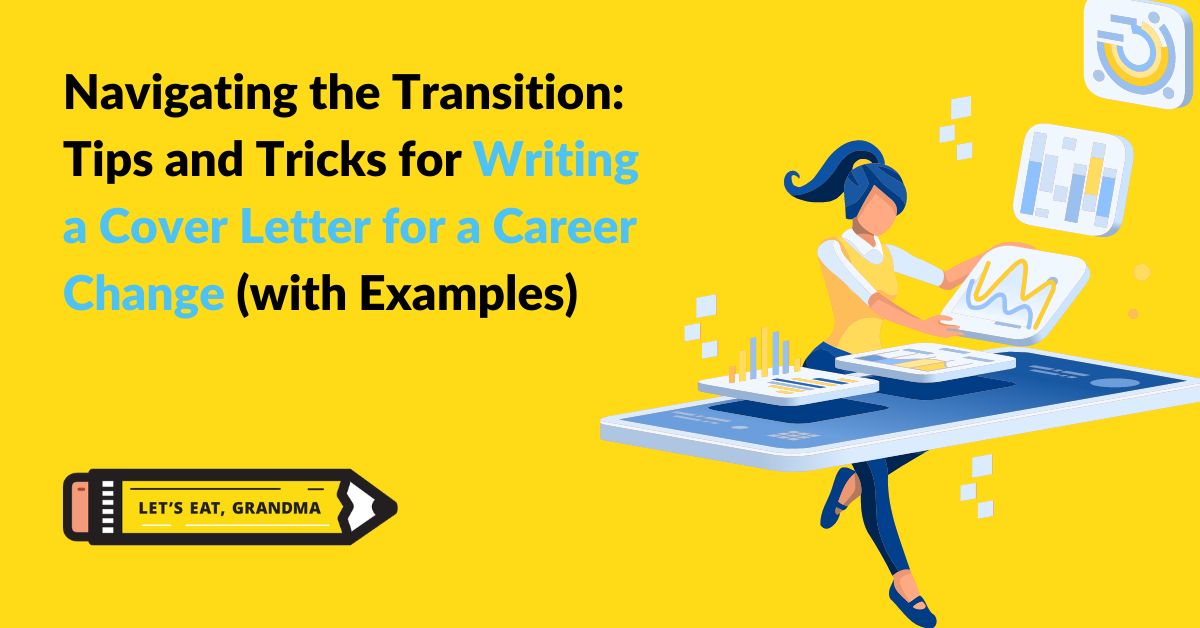A high-quality cover letter is one of the strongest tools you can arm yourself with for a successful career change. When faced with job descriptions that seek specific industry experience, it can be easy to get discouraged from taking the leap in a new direction. However, a carefully written resume and cover letter will bridge the gap between how your past experience applies to your new objective.
While your resume needs to be updated with your professional experience and applicable education (which we can give you a hand with through a free resume critique), it can’t fully explain why you’re eager and prepared to take on a role in a new industry.
Your cover letter is your opportunity to share your passion for your objective field and highlight how the experience you’ve gained supports this goal. While a resume functions as something of a highlight reel of your most relevant skills and professional experiences, your cover letter is your chance to let your personality shine through. By adding important context that can’t be conveyed in the resume, you can show recruiters why you are a good fit for both the industry and their company culture.

Photo by Jens Lelie on Unsplash
The main challenge in writing a cover letter for switching careers is exhibiting your skills and experience in a way that is relevant to your career objective. It isn’t enough to explain what you did in your past roles, you need to explain how you did it, why you did it that way, and what the overall impact was.
Companies are looking for game changers and innovators, so show them how you’ve made a difference throughout your unique skill set.
It’s scary to put yourself out there in a new field, especially when you’re up against candidates who have been in the industry much longer than you. But don’t let the jargon on job descriptions and the expertise of others discourage you. You’re likely much more qualified than you think you are.
You have a unique skill set, a strong drive to start a new journey, and expert writers on your side who can even look over your resume for free before you apply.
It’s important to be intentional when writing a career transition cover letter. These documents can show recruiters and hiring managers the value of your skills and work experience, but you need to pay close attention to the job requirements and your most transferable skills to be successful.
So, before we go into how to write the cover letter, let’s discuss how to set yourself up for success through research and preparation.
How to prepare for writing a cover letter for switching careers
Before you even begin typing up your cover letter, do your research. Do a deep dive into your target industry to find out what’s expected of professionals in that sector. Consider the education level, skill set, and constitution required, and then compare your experience to see what you should highlight.
After you’ve looked at the overall industry, look up the company you’re most excited about applying to and analyze what they’re looking for in an applicant. You can do this by reading its open job descriptions and about pages. This will make it easier to identify your most valuable skills, and give you an idea of the expectations hiring managers in the field will have.
Preparing ahead of time will help you identify key industry-specific qualifications, and can help you improve your chances by seeking out licenses and certifications that can increase your relevant experience.
When you refresh your documents for your job search, the first thing you should do is determine your specific strengths. Then, think about how they apply to the target industry. For example, you may be a fantastic project manager with a history of leading cross-functional teams that exceed anticipated revenue. It doesn’t matter what industry you’re coming from or going to – that’s extremely valuable to any employer.
You can easily integrate these experiences into your cover letter as strong examples of your proficiencies in action, and you can leverage them further by communicating your excitement to apply these transferable skills to the target industry or company mission.

Photo by Thought Catalog on Unsplash
How to structure a cover letter for switching careers
The structure of your cover letter is nearly as important as the content itself. Without clear formatting that prioritizes the most valuable skills for your career change, you may end up burying the lead.
Introduction
The opening paragraph is the most important part of a cover letter for switching careers. Right out of the gate you need to grab the reader’s attention and state your intention to change careers. This clearly communicates the context of your experience, and shows that you have a different background than other applicants.
For example, if you were transitioning from higher education administration to finance, you may write:
With a six-year history of meticulous administrative work in higher education, I have fine-tuned my skills to manage budgets and payroll effectively. Recently, I expanded my competencies, earning a certificate in financial analysis, fueling my passion for strategic fiscal management. I am excited to leverage this combination of practical experience and newfound knowledge to significantly contribute as a Finance Manager at [company].
Or perhaps you are making the switch from marketing to software development:
With a solid background in marketing, combined with my recent, rigorous training in software development, I possess a unique blend of skills that foster innovative and effective solutions. As a continuous learner, I have adapted my critical thinking and problem-solving abilities, gained in the fast-paced marketing environment, to mastering programming languages and software engineering principles, eager to bring a fresh perspective to your software development team.
Once you’ve drafted a strong introductory paragraph, it’s time to move into the meat of the letter.
Body paragraphs
The body paragraphs are your opportunity to explain your transferable skills and experiences in greater detail. The most effective way to do this is to provide specific accomplishments. You need to back up your claims of your skills with examples of how you used them in your current and previous roles – and what the results were.
Your transferable skills, above all, should be relevant. You need to clearly show why these skills are an asset to the company and how you’ve successfully applied them throughout your career.
For example, it wouldn’t be effective for the job seeker from the previous example moving from marketing to back-end software development to highlight skills in advertising or content creation. Instead, they can champion their empathetic verbal and written communication style, and back it up with examples of improved team collaboration leading to campaign success as a result of this skill. And of course, they should tie in any technical skills used as well.
Example:
I have honed my expertise in written and verbal communication, strategic planning, and team coordination over the past five years while leading my marketing team. Recently, I’ve focused on leveraging these skills in the realm of software development, enhancing my technical knowledge to match my proven communication capabilities. I developed and led a cross-functional project at XYZ Corporation, which involved using Python to automate and optimize the marketing data analysis process, resulting in a 35% reduction in time spent on data processing and a 20% increase in marketing campaign efficiency.
Conclusion
After you’ve communicated your most valuable transferable skills with practical experience, you can move into your closing paragraph.
This is your final chance to tell the hiring manager or recruiter why you’re excited to work with them and how you can support the overall company mission. You should reiterate your enthusiasm and interest honestly, but professionally.
For example:
In summary, I am truly passionate about the logistics and supply chain industry, and I look forward to the opportunity to apply my extensive experience in operations management to drive success for your company.

Photo by Sweet Life on Unsplash
Considerations when tailoring a cover letter for your career change
Focus on the future
Overall, it’s important to remember to customize your cover letter to the target industry. While you honed these transferable skills in your previous line of work, you’ll increase your chances of getting the interview if you make sure to show how you will apply them to the new environment.
Additionally, tailoring your cover letter for the target industry shows your knowledge and understanding of the target field. Without adjusting your skills and experience for the specific context, your letter may come off as vague or uninformed, which likely won’t inspire confidence in a hiring manager or recruiter.
For example, if you’re a teacher who wants to leave education for another industry, you need to show how your work in group leadership and operations management can be applied to a new challenge:
I am passionate about mentoring people and leading organizations to achieve their full potential, and my previous experience as a teacher has honed my skills in communication and proactive problem solving. Whether it is breaking down complex, technical topics into layman’s terms or identifying potential areas for operational growth, I am committed to fostering a balanced work environment.
What to say if you don’t have a lot of experience
Finally, one of the biggest challenges in writing a career change cover letter is determining how and when to acknowledge your lack of direct experience. Never be self-deprecating – you need to have confidence in yourself if you want employers to be confident in you too.
Approach it from a “glass half full” perspective. Instead of focusing on what you don’t have, concentrate on what you do. Your passion and drive to make it in this new field, the certifications or training you’ve completed, or your industry-related independent research and projects, are a much better use of page space than trying to explain why you don’t have certain experience.
Example:
While I am just beginning my career journey in [industry], my diverse skill set and proven adaptability provide a strong foundation for rapid learning and effective contribution. I have consistently demonstrated a strong work ethic, problem-solving abilities, and a passion for continuous learning in my previous roles, and I am eager to apply these transferable skills and my keen interest in [industry] to the [specific role] at [company]. I am confident my unique perspective, commitment, and drive can bring value to your team, and I am excited about the opportunity to learn and grow with your organization.
Creating a cover letter for switching careers
There are a lot of steps to creating a well-structured cover letter for switching careers. It requires self reflection, analysis, and research. You need to be honest and intentional without misrepresenting yourself or undermining your skill set. If you need assistance through the process, don’t be afraid to ask for help.
It’s no easy feat to change careers, especially if you’ve been moving in one direction for a long time. But we’re confident that as long as you prepare yourself with industry-focused research, highlight your transferable skills, and tailor your documents for each position, you’ll be able to successfully transition into your dream field.
Ready for more job search help?
Sign up for a free Senior Writer Resume Critique to see what’s holding you back from landing interviews. One of our top professional resume writers will give you personalized feedback on the top 3 items you can improve based on our expert practices!




